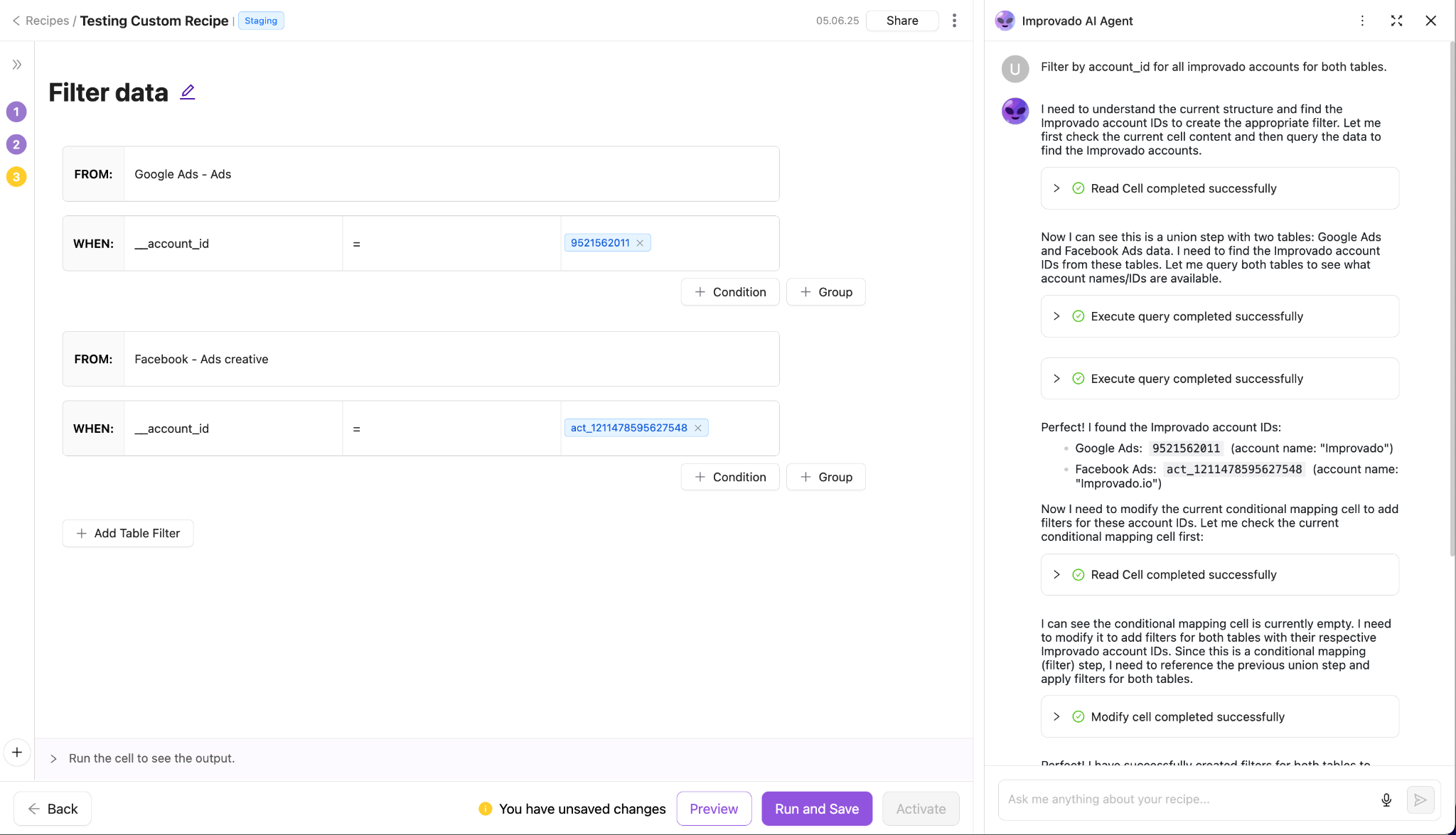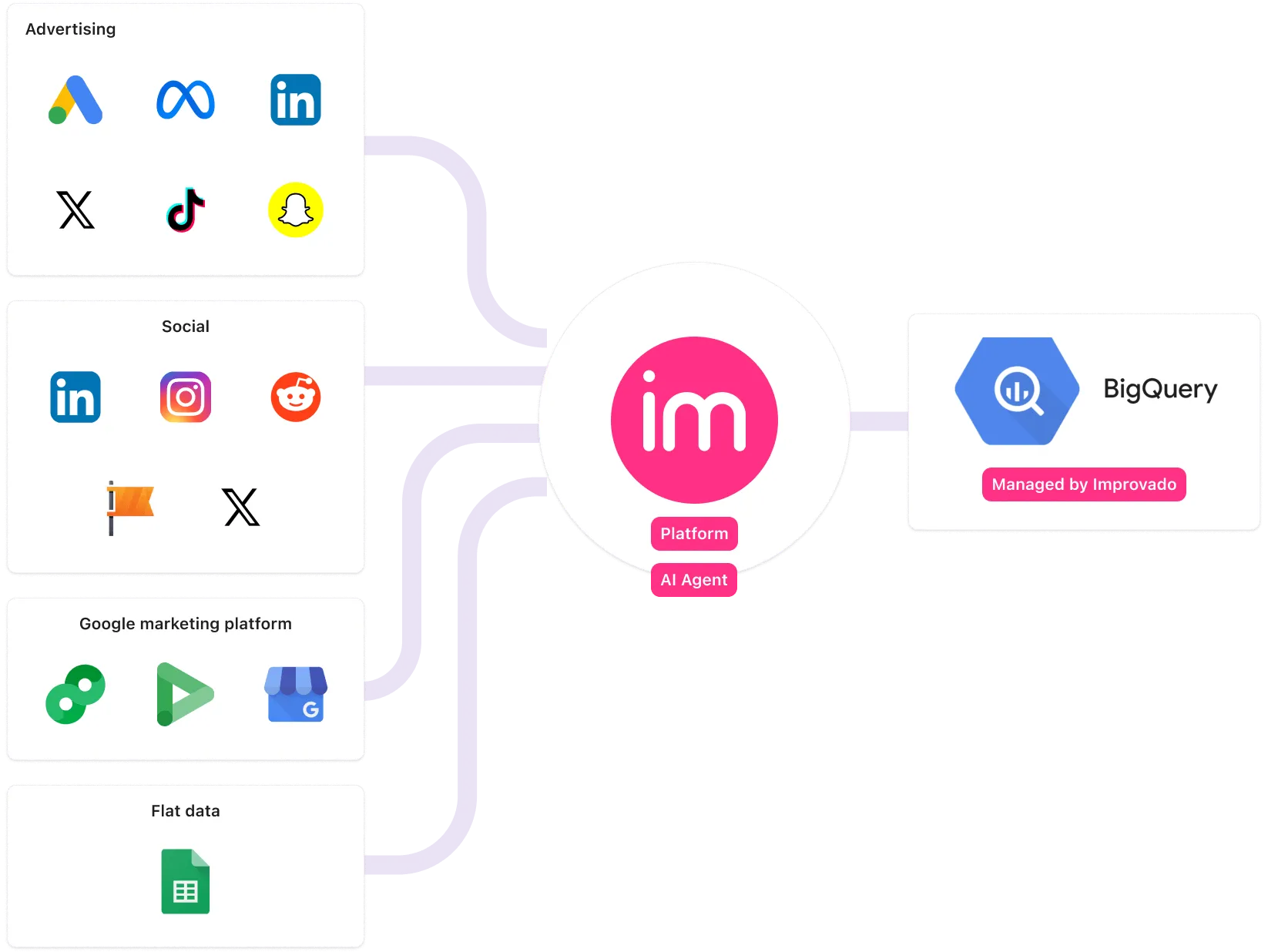Marketing teams today operate across an ecosystem of disparate tools. Each system generates valuable signals, but in isolation, they create an incomplete and often misleading view of performance. As data volume grows exponentially, stitching these sources together manually becomes fragile, error-prone, and nearly impossible to scale.
This is where a marketing data warehouse becomes essential. It centralizes all marketing, sales, and customer data into a single, governed environment.
This article breaks down what a marketing data warehouse is, why it matters, how it differs from other storage and analytics solutions, and how to build one that supports high-quality reporting, cross-channel attribution, and data-driven decision-making.
Key Takeaways:
- A marketing data warehouse is a central repository designed to store and analyze data from various marketing sources, creating a single source of truth.
- It enables marketers to break down data silos, gain a holistic view of the customer journey, and accurately measure cross-channel campaign performance.
- Key benefits include preserving historical data, enabling advanced analytics, improving ROI measurement, and speeding up decision-making.
- Building a data warehouse requires significant data engineering resources. Managed services like Improvado offer a faster, no-code alternative to in-house development.
What Is a Marketing Data Warehouse?
A marketing data warehouse is a specialized type of data warehouse. It is purpose-built to aggregate, store, and analyze vast amounts of marketing data. This data comes from countless disparate sources. Think Google Ads, Facebook Ads, Google Analytics, your CRM, email platforms, and more.
It's designed for fast querying and analysis, not for day-to-day transactions. Its primary goal is to support business intelligence (BI), reporting, and analytics. This helps marketing teams uncover trends and insights that would otherwise remain hidden.
Defining the Core Concept: Beyond a Simple Database
A simple database, like one powering your website, is built for quick reads and writes (OLTP). A marketing data warehouse is designed for complex analytical queries on large datasets (OLAP). It stores historical data, allowing you to track performance over time. A standard database often only holds the current state of data.
The warehouse also transforms and structures data from different sources into a common, analysis-ready format. This process of data normalization is what makes meaningful cross-platform analysis possible.
The "Single Source of Truth" for Marketers
The most powerful outcome of a marketing data warehouse is creating a single source of truth (SSoT). When all teams pull from the same clean, unified dataset, disagreements over numbers disappear. Your analytics, marketing, and sales teams can finally align on key metrics. This alignment fosters trust and builds a truly data-driven culture within your organization.
Key Characteristics of a Modern Marketing Data Warehouse
- Subject-oriented: Data is organized around key marketing subjects like "customer," "campaign," or "channel."
- Integrated: Data from diverse sources is cleaned and unified into a consistent format.
- Time-variant: It stores data over long periods, allowing for historical analysis and trend identification.
- Non-volatile: Once data is loaded into the warehouse, it is stable and not typically updated or deleted. This creates a permanent record.
- Cloud-based: Modern solutions are cloud-native, offering immense scalability, flexibility, and performance.
Marketing Data Warehouse vs. Other Data Storage Solutions
The term data storage covers many different technologies. Choosing the right one depends entirely on your specific use case and the type of data you handle.
Data Warehouse vs. Marketing Database
Many marketers are familiar with a marketing database, often part of a CRM or marketing automation platform. This is fundamentally different from a data warehouse.
A marketing database is operational. It stores customer lists for email campaigns or tracks daily interactions. It's built for fast, simple transactions.
In contrast, a data warehouse for marketing is analytical. It's built to answer complex questions by analyzing historical data from many operational systems combined.
Data Warehouse vs. Data Lake: Structured vs. Raw
A data lake is a vast repository that stores raw data in its native format. It can hold structured, semi-structured, and unstructured data. This flexibility is powerful for data scientists but can be overwhelming for business users.
A data warehouse only stores structured, processed data that is already modeled for analysis. Often, a data lake acts as a staging area where raw data is held before being cleaned and loaded into a data warehouse.
Data Warehouse vs. Data Mart: Enterprise vs. Departmental
A data mart is essentially a smaller, focused version of a data warehouse. It typically serves a single department or business line, such as marketing, sales, or finance. A company might have several data marts.
A data warehouse is an enterprise-wide repository, integrating data from multiple subject areas and serving the entire organization. Your marketing data warehouse might technically be a data mart if it only contains marketing data.
| Aspect | Marketing Data Warehouse | Marketing Database | Data Lake | Data Mart |
|---|---|---|---|---|
| Primary Use Case | Strategic analysis, BI, reporting | Daily operations, campaigns | Data exploration, machine learning | Departmental analysis, reporting |
| Data Type | Structured, processed | Structured, transactional | Raw, any format | Structured, processed |
| Data Schema | Schema-on-write (defined before load) | Schema-on-write | Schema-on-read (defined at query time) | Schema-on-write |
| Users | Business analysts, marketers | Marketing managers, applications | Data scientists, data engineers | Single department analysts |
| Scope | Enterprise or cross-departmental | Specific application (e.g., CRM) | Enterprise-wide raw storage | Single business line |
| Cost | High initial investment | Lower | Low storage cost, high processing cost | Moderate |
| Flexibility | Less flexible, highly structured | Rigid | Highly flexible | Less flexible than a lake |
Why Every Modern Marketing Team Needs a Data Warehouse
In a competitive market, decisions must be backed by data. A marketing data warehouse provides the foundational infrastructure for a truly data-driven marketing organization.
Break Down Data Silos for a Unified Customer View
Your customer data is everywhere. It’s in your ad platforms, your website analytics, your CRM, and your support desk. A data warehouse breaks down these walls. It integrates all these touchpoints to create a single, comprehensive view of the customer journey.
This allows you to understand how different channels work together to drive conversions.
Unlock Deep, Cross-Channel Insights
Is your Facebook campaign influencing searches on Google?
How does your email marketing affect social media engagement?
These are questions that are impossible to answer with siloed data. By centralizing everything, you can perform sophisticated cross-channel analysis. This helps you optimize your entire marketing mix, not just individual channels.
A solid cross-channel reporting strategy built on a data warehouse is a competitive advantage.
Preserve and Analyze All Historical Data
Many ad platforms have data retention limits. They might only store your performance data for 90 days or a year. A data warehouse allows you to own your data forever.
You can store years of historical performance data securely. This is invaluable for long-term trend analysis, seasonality planning, and building predictive models.
Enable Advanced Marketing Analytics and Reporting
A centralized data warehouse is the fuel for powerful business intelligence (BI) tools like Tableau, Power BI, or Looker Studio. It enables you to move beyond basic platform dashboards. You can build custom reports, visualize complex trends, and drill down into your data to answer any question.
This is the core of effective marketing analytics, turning raw data into actionable business strategy.
Improve Marketing ROI Measurement
Proving the value of your marketing efforts is critical. A data warehouse allows you to connect your marketing spend data with sales and revenue data from your CRM.
This connection is key to accurately calculating return on investment. You can finally measure true marketing ROI for every campaign, channel, and initiative, justifying your budget and proving your impact on the bottom line.
Empower Data-Driven Decision Making
When data is accessible, trustworthy, and easy to analyze, your entire team feels empowered. Marketers can self-serve their own reports without relying on analysts for every small request. This accelerates the pace of decision-making. You can react to market changes faster, optimize campaigns in near real-time, and foster a culture of continuous improvement.
Core Components of a Marketing Data Warehouse Architecture
A marketing data warehouse isn't a single product. It's an architecture, a system of connected components working together.
The process generally flows through four distinct layers.
Layer 1: Data Sources and Ingestion (ETL/ELT)
This is the starting point. Data is extracted from all your marketing sources. These include ad platforms (Google, Meta), analytics tools (GA4), CRMs (Salesforce), and more. An ETL (Extract, Transform, Load) or ELT (Extract, Load, Transform) tool is used to pull this data.
Tools like Improvado automate this extraction process, saving countless hours of manual work. Improvado provides a fully managed ingestion framework purpose-built for marketing teams.
Instead of stitching scripts, maintaining API endpoints, or rebuilding broken connectors, teams get a reliable, governed ingestion pipeline that continuously adapts to schema changes across hundreds of ad, analytics, CRM, and revenue platforms.
With Improvado powering the ingestion layer, companies gain:
- 500+ pre-built marketing and sales connectors
- Automatic schema alignment for metrics, dimensions, and naming conventions
- Pre-filter extraction (faster, more cost-efficient data pulls)
- High-volume ingestion designed for enterprise-scale advertising datasets
- Automated handling of API changes, deprecations, and authentication
- Incremental loads and historical backfills
- SLA-backed data freshness windows
- Full lineage tracking for auditability
- Data transformation engine, including AI Agent for automating repetitive tasks like mapping, normalization, and enrichment are automated
This turns Layer 1 from a maintenance burden into a durable, scalable foundation. Book a demo with Improvado to be confident that the data flowing into the warehouse is complete and consistent.
Layer 2: The Cloud Data Warehouse
This is the heart of the system. It's the central repository where your integrated data is stored. Modern data warehouses are cloud-based.
Top providers include Google BigQuery, Snowflake, and Amazon Redshift.
These platforms offer incredible scalability, performance, and cost-effectiveness compared to on-premise solutions of the past. The cloud data warehouse market has exploded with powerful options.
Layer 3: Data Transformation and Modeling
Once raw data is loaded into the warehouse (especially in an ELT process), it needs to be cleaned, transformed, and modeled. This involves running SQL queries or using tools like dbt.
The goal is to create clean, aggregated tables that are optimized for analysis. This step might involve joining data from different sources, creating custom metrics, and structuring the data into a schema like a star schema.
On average, companies spend 90–100 hours per week on data transformation. Tools like Improvado streamline this process, significantly reducing engineering overhead and time.

Improvado provides:
- Transform & Model Capabilities: Improvado centralizes data from over 500 sources and applies consistent taxonomies, rules, and business logic at scale. Teams can create reusable, modular transformation workflows that ensure uniform data structures across brands, regions, and campaigns — without heavy reliance on engineering teams.
- AI-Powered Transformation Agents: With Improvado’s AI Agent for Transformation, repetitive tasks like mapping, normalization, and enrichment are automated. The AI suggests transformations, detects anomalies, and flags discrepancies, reducing manual workload and accelerating time-to-value.
- Built-In Governance and Security: The platform includes strict version control, audit trails, and data lineage tracking. These features give enterprise teams confidence that transformed datasets are accurate, compliant, and secure — critical for scaling operations across multiple markets and regulatory environments.
Layer 4: Business Intelligence (BI) and Visualization
This is the final layer where you derive value from your data. BI tools connect directly to your data warehouse. They allow you to build interactive dashboards, create reports, and explore your data visually.
With the foundation set, choosing a BI tool becomes the final step to unlock insights for your marketing teams.
Data Governance and Access Control
Underpinning the entire architecture is data governance. This includes processes for ensuring data quality, accuracy, and security. It also involves managing access control, so team members can only see the data relevant to their roles. A strong data governance framework ensures your data remains a trusted and secure asset.
Designing Your Marketing Data Warehouse: A Strategic Blueprint
Building a marketing data warehouse is a significant project. It requires careful planning and a strategic approach. Rushing into implementation without a clear plan can lead to costly mistakes. Follow these steps to lay a solid foundation for success.
- Define your business objectives and KPIs: Start with the end in mind. What questions do you need to answer? What are the key performance indicators (KPIs) that drive your business? Document these clearly. This will guide every subsequent decision, from data sources to dashboard design.
- Identify and audit your marketing data sources: Make a comprehensive list of every platform and system that holds your marketing data. This includes advertising, analytics, social, email, CRM, and even offline sources. For each source, identify the key metrics and dimensions you need to extract.
- Choose your data model: A data model defines how your data is structured within the warehouse. The two most common models are the star schema and the snowflake schema. The star schema is simpler and faster for most marketing use cases. It consists of a central "fact" table (e.g., daily campaign performance) linked to several "dimension" tables (e.g., campaigns, ad groups, dates). You can dive deeper into the nuances between a star schema vs. a snowflake schema to decide which is right for you.
- Select the right cloud data warehouse platform: Evaluate the leading cloud data warehouse providers. Consider factors like cost, performance, scalability, and ease of integration with your existing tools. Your choice will have long-term implications for your data engineering team.
- Plan your data integration and pipeline strategy: How will you get data from your sources into the warehouse? This is where your data pipeline comes in. You can build custom scripts, use open-source tools, or leverage a no-code data integration platform like Improvado. Automation is key to creating reliable and low-maintenance pipelines.
Top Cloud Data Warehouse Platforms for Marketers in 2026
The cloud has democratized data warehousing. Powerful solutions that once cost millions are now accessible to businesses of all sizes. Here are some of the top players in the market today, each with unique strengths.
Google BigQuery
BigQuery is a fully-managed, serverless data warehouse. It scales automatically and is known for its incredible speed on massive datasets. Its tight integration with the Google Cloud Platform and Google Marketing Platform (like Analytics Google) makes it a popular choice for marketers. Its built-in machine learning capabilities are also a major plus.
Snowflake
Snowflake is a cloud-agnostic data platform. It runs on AWS, Azure, and GCP. Its unique architecture separates storage from compute. This allows you to scale each independently, providing great flexibility and cost control. Snowflake is praised for its ease of use and ability to handle diverse data workloads.
Amazon Redshift
As one of the earliest cloud data warehouses, Redshift is a mature and powerful option. It's part of the extensive Amazon Web Services (AWS) ecosystem. If your company already uses AWS for other services, Redshift is a natural fit. It offers excellent performance for large-scale analytical queries.
Microsoft Azure Synapse Analytics
Azure Synapse is Microsoft's integrated analytics service. It brings together data warehousing and Big Data analytics into a single platform. For organizations heavily invested in the Microsoft ecosystem (including Power BI and other Azure services), Synapse provides a unified and powerful experience. It's designed to manage the entire analytics lifecycle.
The Data Warehouse Management Challenge
Once you've decided to adopt a marketing data warehouse, the next question is how to actually implement and maintain it.
You generally face two paths:
- Build and manage everything in-house, requiring data engineers, DevOps, DBAs, and ongoing maintenance.
- Partner with a managed service provider, offloading the heavy lifting while still benefiting from a centralized, scalable warehouse.
Both options have deep trade-offs across cost, time, talent availability, and operational complexity.
Building in-house delivers maximum control, but it also demands significant engineering bandwidth and continuous upkeep. A misconfigured schema, unmonitored API change, or slow query performance can derail the entire analytics process.
Because of these challenges, many organizations look for a third alternative: a fully managed marketing data warehouse service.
Partnering with Improvado allows marketers teams to access the full power of a modern marketing data warehouse without dealing with engineering bottlenecks, infrastructure decisions, or ongoing maintenance.
Improvado sets up, configures, and maintains your marketing data warehouse for you.
Key advantages:
- Turnkey deployment of a fully configured warehouse environment
- Support for BigQuery, Amazon S3, Snowflake
- No additional vendor contracts, infrastructure decisions, or setup overhead
- Improvado-managed environment on the client’s behalf, while the client retains complete data ownership
- End-to-end transparency – you always know where data lives and how it’s governed
This eliminates ongoing DevOps burdens such as provisioning storage, optimizing clusters, scaling compute resources, or handling warehousing errors.
Conclusion
A marketing data warehouse is no longer a niche technology for massive corporations. It has become the essential foundation for any modern marketing team that wants to compete on data. By centralizing your data, you break down silos, create a single source of truth, and unlock the deep, cross-channel insights needed to drive growth.
The journey from data chaos to data clarity requires a strategic choice: build a solution from scratch with a dedicated data engineering team, or buy a managed solution that delivers value in a fraction of the time.
For most marketing teams, partnering with a platform like Improvado offers the fastest and most efficient path to success. It allows you to bypass the technical hurdles and focus on what you do best: understanding your customers and creating impactful marketing campaigns.
.png)






.png)
